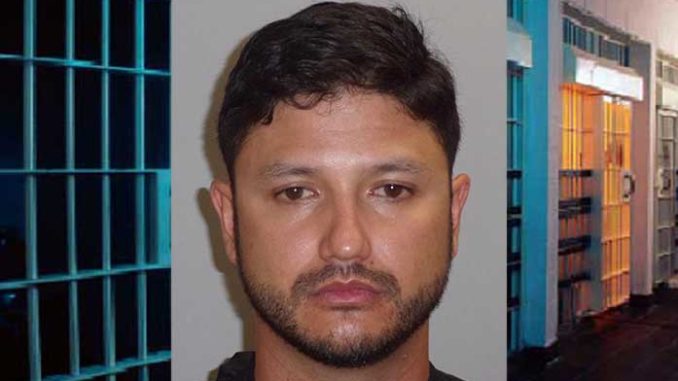
A Sierra Vista who has remained in jail since June awaiting trial on molestation and child pornography charges will return to court next month to argue why much of the evidence in the case should never be presented to a jury.
Aaron Gabriel DiBuono was indicted this summer on 26 counts alleging sexual misconduct between January 2012 and June 2020, as well as possession of child pornography. The majority of the charges are Class 2 felonies which require mandatory prison time, including one count that carries a life sentence.
On Jan. 13, DiBuono will appear before Judge Timothy Dickerson of the Cochise County Superior Court for a hearing on a defense motion to suppress evidence that was obtained during a search of DiBuono’s computer. The motion alleges Sierra Vista detectives relied on search warrant that was “so impermissibly broad” to constitute an illegal general warrant.
“The procedure for obtaining search warrants in Cochise County often violates the Constitutional provision against general warrants,” co-defense counsel Richard Lougee told Arizona Daily Independent. “This occurs too often to be ignored.”
DiBuono, 33, came under investigation in mid-June when a former member of his household reported being sexually molested by him in 2012. The minor also described sexually suggestive comments DiBuono allegedly made in 2019 via social media.
On June 29, Det. John Andela monitored a social media conversation between the minor and DiBuono before the detective took on the minor’s identity and continued exchanging messages with DiBuono. During the messaging DiBuono reportedly admitted to some past misconduct with the minor and then sent sexually explicit images of himself to whom he believed was the minor.
Eventually DiBuono arranged to meet the minor at a local park on June 30 for the purpose of going to DiBuono’s home to have sex. DiBuono was arrested when he arrived at the park.
The fight over the search warrant involves what happened after DiBuono was taken into custody.
Andela authored an affidavit for a search warrant to allow detectives to search DiBuono’s home and two vehicles for the purpose of seizing computers, cell phones, and other devices “capable of storing, sending, receiving, or processing any electronic media.” It also allowed the seizure of digital media (such as CDs, thumb drives, SD cards) capable of storing digital files.
The search warrant also authorized a forensic search of any seized items for “files depicting underage children unclothed or partially clothed or depicted in a sexual manner.”
The forensic search was conducted by Det. Thomas Ransford who discovered several images of child pornography on DiBuono’s computer with file dates between December 2017 and December 2018. The images are of the same minor in the molestation case, according to court records.
Lougee and co-defense counsel Ralph Ellinwood argue the detectives had no probable cause to believe DiBuono possessed child pornography. In fact, the only photo DiBuono refers to in his communication is an image of the girl’s face.
“The sole basis of fact to support this search warrant was Snapchat exchanges between the alleged victim, Detective Andela, and Mr. DiBuono,” the motion states. “This created probable case only to search Mr. DiBuono’s cell phones as Snapchat does not exist on computers.”
The defense motion also cites a 2017 opinion by the Arizona Court of Appeals in which a Cochise County man’s child pornography conviction and 21-year prison sentence were overturned because the search warrant approved by a local justice of the peace failed to provide probable cause for why the man’s computer should be searched during a child molestation investigation.
Prosecutor Rachel Raynes of the Cochise County Attorney’s Office filed a response opposing DiBuono’s motion to suppress, although she does not address the issue of probable cause for seeking child pornography on DiBuono’s computer.
“Officers had no way of knowing what device or devices the Defendant used to access the internet-based applications he used to communicate with…the minor victim,” she wrote, adding that the defense “has not presented this Court with sufficient facts or legal arguments to support his claim that the search warrant was so broad as to constitute an illegal general warrant.”
Even if Dickerson deems all or part of the search warrant deficient, Raynes argues the evidence from DiBuono’s computer should still be admitted at trial under a good-faith exemption because Ransford relied on what he believed was a lawful search warrant obtained by Andela.
Court records reveal that the mother admitted to Andela that she used “edible marijuana” and a marijuana vape pen with DiBuono and the minor in 2018 and 2019. The detective told Arizona Daily Independent that no charges are pending at this time related to the mother’s conduct allowing the minor to engage in harmful conduct.
Andela also said he has no information to suggest DiBuono had inappropriate contact with other minors.
